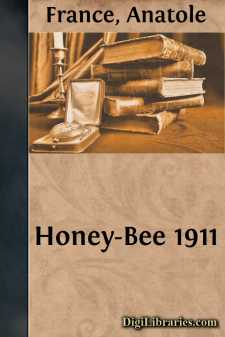Categories
- Antiques & Collectibles 13
- Architecture 36
- Art 48
- Bibles 22
- Biography & Autobiography 813
- Body, Mind & Spirit 142
- Business & Economics 28
- Children's Books 17
- Children's Fiction 14
- Computers 4
- Cooking 94
- Crafts & Hobbies 4
- Drama 346
- Education 46
- Family & Relationships 57
- Fiction 11829
- Games 19
- Gardening 17
- Health & Fitness 34
- History 1377
- House & Home 1
- Humor 147
- Juvenile Fiction 1873
- Juvenile Nonfiction 202
- Language Arts & Disciplines 88
- Law 16
- Literary Collections 686
- Literary Criticism 179
- Mathematics 13
- Medical 41
- Music 40
- Nature 179
- Non-Classifiable 1768
- Performing Arts 7
- Periodicals 1453
- Philosophy 64
- Photography 2
- Poetry 896
- Political Science 203
- Psychology 42
- Reference 154
- Religion 513
- Science 126
- Self-Help 84
- Social Science 81
- Sports & Recreation 34
- Study Aids 3
- Technology & Engineering 59
- Transportation 23
- Travel 463
- True Crime 29
Anatole France
Anatole France, born François-Anatole Thibault, was a French novelist, poet, and journalist known for his wit and skepticism towards conventional wisdom. He won the Nobel Prize in Literature in 1921 in recognition of his brilliant literary achievements. His works often explored philosophical and social themes, blending satire with poignant observations on human nature and society.
Author's Books:
Sort by:
by:
Anatole France
CHAPTER I THE strangest, the most varied, the most erroneous opinions have been expressed with regard to the famous individual commonly known as Bluebeard. None, perhaps, was less tenable than that which made of this gentleman a personification of the Sun. For this is what a certain school of comparative mythology set itself to do, some forty years ago. It informed the world that the seven wives of...
more...
by:
Anatole France
CHAPTER I NICOLAS, a scion of an illustrious family of Vervignole, showed marks of sanctity from his earliest childhood, and at the age of fourteen vowed to consecrate himself to the Lord. Having embraced the ecclesiastical profession, he was raised, while still young, by popular acclamation and the wish of the Chapter, to the see of St. Cromadaire, the apostle of Vervignole, and first Bishop of...
more...
by:
Anatole France
PREFACE TO THE ENGLISH EDITION CHOLARS have been good enough to notice this book; and the majority have treated it very kindly, doubtless because they have perceived that the author has observed all the established rules of historical research and accuracy. Their kindness has touched me. I am especially grateful to MM. Gabriel Monod, Solomon Reinach and Germain Lefèvre-Pontalis, who have discovered in...
more...
by:
Anatole France
What one first notes about The Queen Pedauque is the fact that in this ironic and subtle book is presented a story which, curiously enough, is remarkable for its entire innocence of subtlety and irony. Abridge the "plot" into a synopsis, and you will find your digest to be what is manifestly the outline of a straightforward, plumed romance by the elder Dumas. Indeed, Dumas would have handled...
more...
by:
Anatole France
CHAPTER I he scene was an actress's dressing-room at the Odéon. Félicie Nanteuil, her hair powdered, with blue on her eyelids, rouge on her cheeks and ears, and white on her neck and shoulders, was holding out her foot to Madame Michon, the dresser, who was fitting on a pair of little black slippers with red heels. Dr. Trublet, the physician attached to the theatre, and a friend of the...
more...
by:
Anatole France
The real name of the subject of this preface is Jacques-Anatole Thibault. He was born in Paris, April 16, 1844, the son of a bookseller of the Quai Malaquais, in the shadow of the Institute. He was educated at the College Stanislas and published in 1868 an essay upon Alfred de Vigny. This was followed by two volumes of poetry: 'Les Poemes Dores' (1873), and 'Les Noces Corinthiennes'...
more...
by:
Anatole France
CHAPTER I THE story of the Sleeping Beauty is well known; we have excellent accounts of it, both in prose and in verse. I shall not undertake to relate-it again; but, having become acquainted with several memoirs of the time which have remained unpublished, I discovered some anecdotes relating to King Cloche and Queen Satine, whose daughter it was that slept a hundred years, and also to several members...
more...
by:
Anatole France
I Jean Servien was born in a back-shop in the Rue Notre-Dame des Champs. His father was a bookbinder and worked for the Religious Houses. Jean was a little weakling child, and his mother nursed him at her breast as she sewed the books, sheet by sheet, with the curved needle of the trade. One day as she was crossing the shop, humming a song, in the words of which she found expression for the vague,...
more...
by:
Anatole France
"HONEY-BEE" I Which treats of the appearance of the country and serves asIntroduction The sea covers to-day what was once the Duchy of Clarides. No trace of the town or the castle remains. But when it is calm there can be seen, it is said, within the circumference of a mile, huge trunks of trees standing on the bottom of the sea. A spot on the banks, which now serves as a station for the...
more...
by:
Anatole France
variste Gamelin, painter, pupil of David, member of the Section du Pont-Neuf, formerly Section Henri IV, had betaken himself at an early hour in the morning to the old church of the Barnabites, which for three years, since 21st May 1790, had served as meeting-place for the General Assembly of the Section. The church stood in a narrow, gloomy square, not far from the gates of the Palais de Justice. On...
more...











